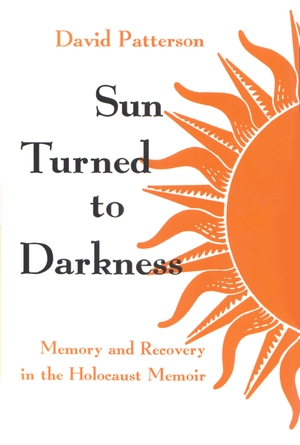"Patterson applies the basics of Emmanuel Levinas's philosophical ideas (especially those in the areas of ethics and belief) to develop a portion of his methodology for interpreting the memoirs of Holocaust survivors. This study uniquely combines historical Jewish rabbinical teachings and the theories of Levinas into a coherent whole, treating the memoir as a tool for Holocaust survivors to slowly come to terms with their experiences. Patterson examines the themes of mother, father, loss, the existence of God, and the duty to bear witness. Studies of individual Holocaust memoirs or a series of memoirs by a single author (e.g., Elie Wiesel) have been available to readers, but Patterson accesses more obscure writers, expanding the knowledge of Holocaust literature considerably. However, because of the complex phenomenological treatment of the topic, this study will be of interest mainly to collections specializing in the Holocaust or 20th-century philosophy."—Library Journal
"Patterson has expounded 'Recovery' after the Holocaust as I have defined it—but more correctly than I could have done myself."—Emil L. F ackenlieim, Professor Emeritus, University of Toronto
"A sensitive and original book. It's a gem that creatively demonstrates how memoir literature addresses the break in the cosmos wrought by the Shoah. Moving beyond earlier literary interpretations, David Patterson speaks poetically of the soul's memory of itself, and of God. He writes with both insight and reverence in demonstrating how the recovery attested in memoir literature is, like the Jewish tradition itself, eternal."—Alan L. Berger, Raddock Eminent Scholar Chair of Holocaust Studies, Florida Atlantic University
"A major contribution to the literature of the Holocaust. Patterson reinterprets Holocaust narratives from the perspective of post-Holocaust philosophy and theology. In doing so, he restores not only a religious, but a human, dimension to the subject."—David H. Hirsch, Professor Emeritus of English and Judaic Studies, Brown University
Description
In examining the recorded memoirs of fifty Holocaust survivors, David Patterson draws on the teaching of the sacred texts of Jewish tradition and the philosophy of Emil Fackenheim and Emmanuel Levinas.
That memory, he argues, serves three purposes for Jews struggling to recover after the Holocaust. First, a recovery of tradition: Not only was the body of Israel targeted for destruction, but also its very soul, as that soul was defined by God, Torah, and sacred history. Second, a recovery from an illness: These Jews suffer from the illness of indifference that plagued heaven and earth throughout the event. Third, these memoirs reveal the open-ended nature of recovery as a process that has no resolution: The survivors emerge from the camps, but the camps stay with the survivors and cast their shadow over the world. Readers are transformed into witnesses who face a never-ending process of remembrance, for the sacred, in spite of indifference.
About the Author
David Patterson is Distinguished Professor and Director of the Honors Program at the University of Memphis. He is the author of more than eighty articles on topics in philosophy, literature, Judaism, Holocaust, and education, and his books include The Greatest Jewish Stories Ever Told, Pilgrimage of a Proselyte, From Auschwitz to Jerusalem, and The Shriek of Silence: The Phenomology of the Holocaust.
September 1998



